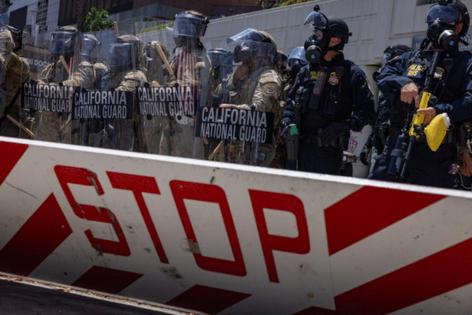Noah Feldman: The National Guard deployment in LA is a threat to democracy
Published in Op Eds
President Donald Trump's deployment of the National Guard to Los Angeles, over the objection of California Governor Gavin Newsom, represents a structural threat to democracy. The law on which Trump relied permits domestic deployment only in cases of invasion by a foreign nation, rebellion, or danger of a rebellion.
Newsom said he intends to sue the Trump administration over the president’s action.
The reasons for the legal limitation go to the heart of constitutional government. In a democracy — as opposed to a dictatorship — the military should not be used to police citizens unless civilian law enforcement cannot or will not do its job.
And if the president can single out protests against his policies and deploy the National Guard specifically to suppress them, it endangers the constitutional rights to free speech and free assembly.
At stake is a fundamental component of the framework of U.S. constitutional democracy. It begins with the principle, enshrined in law, that military forces exist to protect the country from existential threats — such as an invasion or rebellion — not to enforce the law.
Most fundamentally, the founders of the American republic understood very clearly that concentrated military power, loyal to a single man, could be used to achieve total control by that person. And they had a historical example in mind: Rome — a republic governed by the people and the Senate — was transformed into an empire ruled by an emperor as a result of the Roman army being turned against its citizens.
The Founders’ initial solution to the concentration of military power was federalism and decentralization. State militias — acknowledged and recognized in the Second Amendment (which was about keeping those militias vital, not establishing individual gun rights) — were a check on the central authority of a president who was also commander in chief.
Today, the National Guard’s status as a force responsible both to governors and the president still reflects that goal of decentralization-to-protect-democracy. A governor can call out the troops to enforce the law when it’s necessary. The governor is the state’s chief law enforcement officer, closer to its residents and any situation that arises. Such a gubernatorial order typically signals that the need for the National Guard is real, not invented.
The only circumstances that justify the president deploying the National Guard are an actual invasion or a rebellion – either existing or genuinely threatened. There’s no invasion, Trump’s claims about a Venezuelan gang notwithstanding. And there’s no rebellion or threat of one. What there are, rather, are protests — some reportedly peaceful, others reportedly violent and therefore in need of control.
When President John F. Kennedy federalized the Alabama National Guard to desegregate the state’s schools in 1963, it was because Governor George Wallace had, on that day, stood in front of a door at the University of Alabama to keep two Black students from enrolling and declared, “Segregation now, segregation tomorrow, segregation forever.”
It was an overt, direct rejection of the authority of the Supreme Court and the Constitution, and it came with a refusal to desegregate schools despite court orders. It was as close to rebellion as the U.S. has come in the modern era, and it specifically reflected the Southern tradition of rebellion dating back to secession and the Confederacy.
The same was true on March 20, 1965, when President Lyndon B. Johnson federalized the Alabama National Guard to protect a civil rights march for voting rights from Selma to Montgomery. He did so — over the objections of Wallace — after state troopers earlier that month beat and fired on marchers at the Edmund Pettus Bridge, killing a Black man.
The recent events in Los Angeles bear no resemblance to Wallace and Alabama’s rejection of federal law and authority. California isn’t against the federal government or the Constitution. It’s trying to end violent protests and allow peaceful demonstrations to continue.
Which brings us to the further grave danger of Trump’s deployment: the threat to free speech and free assembly as guaranteed by the First Amendment. The Los Angeles protests aren’t against just anything, they are specifically against Trump’s signature policy of deploying ICE to arrest suspected undocumented immigrants. To put it bluntly, Trump is deploying the National Guard to suppress protests against him.
A president who can mobilize military forces against protesters, and chooses to target those upset with his policies, is assuming the power to suppress speech he personally finds threatening. The message will go out, loud and clear, to others: Protest the president, get the National Guard. The effect will be to chill even peaceful protest — protest that is the essence of democratic expression and the right of the people “peaceably to assemble,” as the First Amendment puts it.
If violence becomes too much for the Los Angeles and state police to handle, Newsom can always ask Trump to federalize the guard. The president acting on his own threatens the fabric of constitutional democracy and civilian rule.
_____
This column reflects the personal views of the author and does not necessarily reflect the opinion of the editorial board or Bloomberg LP and its owners.
Noah Feldman is a Bloomberg Opinion columnist. A professor of law at Harvard University, he is author, most recently, of “To Be a Jew Today: A New Guide to God, Israel, and the Jewish People."
_____
©2025 Bloomberg L.P. Visit bloomberg.com/opinion. Distributed by Tribune Content Agency, LLC. ©2025 Bloomberg News. Visit at bloomberg.com. Distributed by Tribune Content Agency, LLC.

























































Comments